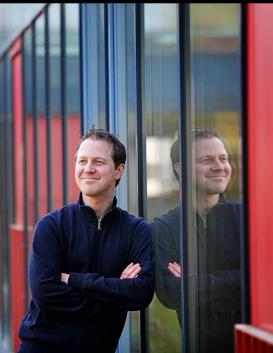
©Amac Garbe/MPG.
Alexander Blum
Visiting Senior Research Fellow (Nov 2017–Oct 2026)
PhD
Room V104
Alexander has a PhD in theoretical particle physics from the University of Heidelberg (research at the MPI for Nuclear Physics, 2009). In 2010 he joined the MPIWG, where he started out as a member of the Quantum History Project (until 2012). After that he was a Research Scholar at the MPIWG, coordinating, among other things, the cooperative project with the Lindau Nobel Laureates Meeting Foundation from 2013–14. In 2017 he was awarded leadership of an independent Max Planck Research Group. Alexander has organized several workshops at the MPIWG (and externally) bringing together physicists, historians, and philosophers to discuss the history and foundations of quantum theory. He also co-organized the large conference celebrating the centenary of general relativity (2015) and is currently a member of the international committee preparing the centenary of quantum mechanics (2025).
Alexander’s research interests lie in the history and philosophy of modern physics, with a strong emphasis on the postwar period. His books include a commented sourcebook on the earliest attempts to bring together quantum theory and general relativity (together with Dean Rickles of the University of Sydney) and a monograph on Werner Heisenberg’s attempts at constructing a final theory in the 1950s. He is currently completing a book for Cambridge University Press on the debate on whether quantum field theory is (or can be turned into) a consistent mathematical framework. He teaches both at the physics department of the FU Berlin and at the history of science department of the TU Berlin.
Projects
Selected Publications
Blum, Alexander S. and Martin Jähnert (2024). “Real Virtuality and Actual Transitions: Historical Reflections on Virtual Entities Before Quantum Field Theory.” Perspectives on Science 32 (3): 329–349. https://doi.org/10.1162/posc_a_00609.
Read More
Blum, Alexander S. and Martin Jähnert (2024). “Quantum Mechanics, Radiation, and the Equivalence Proof.” Archive for History of Exact Sciences 78: 567–616. https://doi.org/10.1007/s00407-024-00334-4.
Read More
Blum, Alexander S. (2022). ‘Es wäre vermessen, Gott mit absoluter Sicherheit auszuschließen.’ Interview by Sasan Abdi-Herrle. Die Zeit December 23, 2022.
Read More
Blum, Alexander S. (2022). “From Wood Chuck Holes to Worm Holes — A Look Into the Notebooks of John A. Wheeler.” Annalen der Physik 534 (8, Article 2200244). https://doi.org/10.1002/andp.202200244.
Read More
Past Events
Workshop
Immanuel Kant (1724–2024): Philosopher–Scientist
MOREInstitute's Colloquium
The Social and Biological Locus of Innovation
MORETalk
From Two-Component Theories to Neutrino Flavor Oscillations: A Long Way in the History of Neutrino Physics
MORESeminar
Léon Rosenfeld and His Understanding of the Necessity of Quantizing Fields
MORESeminar
John Wheeler between Cold Matter and Frozen Stars: The Road Towards Black Holes
MORESeminar
Formal or Material? Gauge and the Gravity-Electromagnetism Analogy
MORESeminar
How "Epistemological Letters" Changed the Foundations of Quantum Mechanics
MORESeminar
Interpreting Complex Data in the History of Science with Network Theory
MORESeminar
Virtual Transitions and the Narrative in Which They Were Included: Its Inception and Its Reception
MORESeminar
The Rochester Conferences on High-Energy Nuclear Physics and Journalization in Mid-20th Century Science Publishing
MORESeminar
Lessons from the Case of the Life Sciences: Thinking toward Philosophy of Science as Interdisciplinarity
MORESeminar
Localizability and vacuum entanglement in (non-)relativistic QFT
MORESeminar
Hermann Weyl's Neighbourhoods: "Spaces" in Mathematics, Physics, Subjectivity, and Historiography
MORESeminar
Eddington’s Philosophy of Science
MORESeminar
Thoughts on Unity in a Divided State: Hans-Jürgen Treder's Early Ideas on the Unification of Physics
MORESeminar
The First Image of a Black Hole
MORE